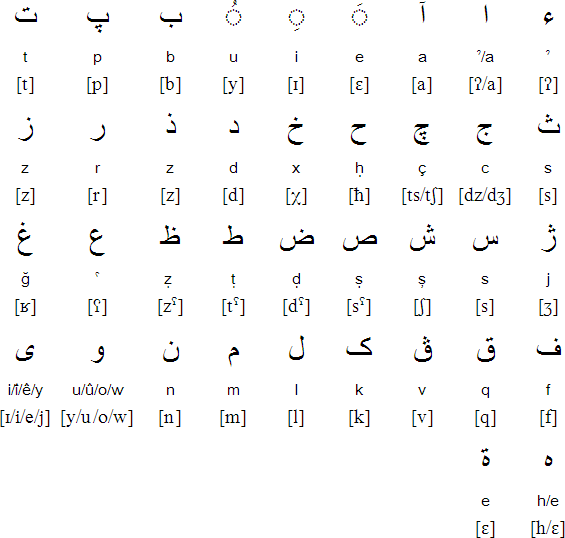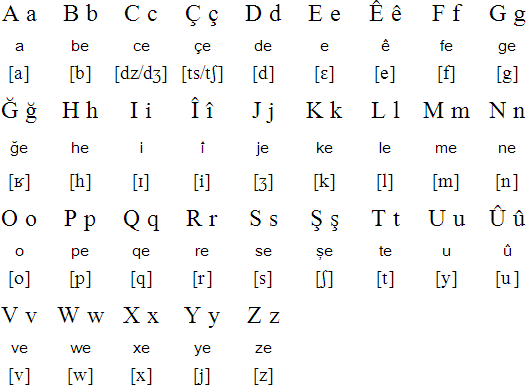Zaza is spoken by about 3 to 6 million people in parts of central and eastern Turkey. It belongs to the Iranian branch of the Indo-Iranian language family and has quite a lot in common with such languages as Gilaki and Talyshi. The language is also known as Dımılki, Kırmancki, Zonê Ma, Şo-Bê or Kırdki.
Zaza was first written in 1850 using a version of the Arabic alphabet. In the 1980s use of the Latin alphabet to write Zaza became popular among the Zaza diaspora in Sweden, France and Germany. Since then a number of books and magazines have been published in Zaza, and there are some radio and TV programmes in the language.


Before e, i and y c is pronounced [dʒ] and ç is pronounced [tʃ]
Zaza alphabets improved by Michael Peter Füstumum
Pêr însanî azad û rûmet û mafan de seyyewbîno yenî dunya. Ê wayerê aqil û wijdan î û ganî pê yewbîno verê be zihniyetêda birayîyê biluwenî.
Translation by Cemre Ömer Ayna
All human beings are born free and equal in dignity and rights. They
are endowed with reason and conscience and should act towards one another
in a spirit of brotherhood.
(Article 1 of the Universal Declaration of Human Rights)
Information about Zazaki | Phrases | Numbers
Information about Zaza
http://en.wikipedia.org/wiki/Zaza_language
http://www.kirmanc.net
http://www.zazaki.de
http://zazaki.de/turkce/makaleler/Keskin-Zazacadakialfabesorunu.pdf
http://iremet.se/our_language_zaza.pdf
http://www.zazaki.de/english/T.L.Todd-AGrammarofDimli.pdf
http://faculty.wcas.northwestern.edu/~maw962/docs/zazaki-mitwpl.pdf
Zaza phrases
http://www.digitaldialects.com/Zazaki.htm
http://wikitravel.org/en/Zazaisch_phrasebook
Enstitüyê Zaza (Zaza Language Institute)
http://www.zazaki-institut.de
Zaza radio
http://www.radiozaza.de
Zazaki portal
http://www.zazaki.net
Avestan, Bactrian Baluchi, Bartangi, Dari, Gilaki, Hazaragi, Ishkashimi, Judeo-Persian, Juhuri, Khufi, Kumzari, Kurdish, Luri, Mazandarani, Munji, Ossetian, Ormuri, Oroshor, Persian, Parthian, Pashto, Rushani, Sanglechi, Sarikoli, Shabaki, Shughni, Tajik, Talysh, Tat, Wakhi, Wanetsi, Yaghnobi, Yazghulami, Yidgha, Zazaki
Adamaua Fulfulde, Afrikaans, Arabic (Algerian), Arabic (Bedawi), Arabic (Chadian), Arabic (Egyptian), Arabic (Gulf), Arabic (Hassaniya), Arabic (Hejazi), Arabic (Lebanese), Arabic (Libyan), Arabic (Modern Standard), Arabic (Moroccan), Arabic (Najdi), Arabic (Sudanese), Arabic (Syrian), Arabic (Tunisian), Arwi, Äynu, Azeri, Balanta-Ganja, Balti, Baluchi, Beja, Belarusian, Bosnian, Brahui, Chagatai, Chechen, Chittagonian, Comorian, Crimean Tatar, Dargwa, Dari, Dhatki, Dogri, Domari, Gawar Bati, Gawri, Gilaki, Hausa, Hazaragi, Hindko, Indus Kohistani, Kabyle, Kalkoti, Karakalpak, Kashmiri, Kazakh, Khowar, Khorasani Turkic, Khwarezmian, Konkani, Kumzari, Kurdish, Kyrgyz, Lezgi, Lop, Luri, Maguindanao, Malay, Malay (Terengganu), Mandinka, Marwari, Mazandarani, Mogholi, Morisco, Mozarabic, Munji, Noakhailla, Nubi, Ormuri, Palula, Parkari Koli, Pashto, Persian/Farsi, Punjabi, Qashqai, Rajasthani, Rohingya, Salar, Saraiki, Sawi, Serer, Shabaki, Shina, Shughni, Sindhi, Somali, Soninke, Tatar, Tausūg, Tawallammat Tamajaq, Tayart Tamajeq, Ternate, Torwali, Turkish, Urdu, Uyghur, Uzbek, Wakhi, Wanetsi, Wolof, Xiao'erjing, Yidgha
Languages written with the Latin alphabet
Page last modified: 08.05.23
[top]
You can support this site by Buying Me A Coffee, and if you like what you see on this page, you can use the buttons below to share it with people you know.

If you like this site and find it useful, you can support it by making a donation via PayPal or Patreon, or by contributing in other ways. Omniglot is how I make my living.
Note: all links on this site to Amazon.com, Amazon.co.uk
and Amazon.fr
are affiliate links. This means I earn a commission if you click on any of them and buy something. So by clicking on these links you can help to support this site.
[top]